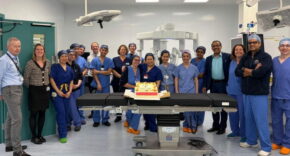
Last week marked a significant milestone with the first-ever parliamentary debate on incontinence in the House of Commons, and we commend Sonia Kumar MP for her leadership in bringing this long-overdue issue to the national stage.
Incontinence affects millions across all demographics; more common than hay fever, yet still widely misunderstood, stigmatised and under-resourced. Sonia rightly pointed to the reality that one in three women are living with this condition and its far-reaching effects on their mental health, relationships, ability to work and overall quality of life. The emotional toll, shame, embarrassment and isolation, remains invisible to most, but impossible to ignore for those experiencing it daily.
Our own research echoes the urgency of change: a fifth of female sufferers have lived with symptoms for over a decade. Perhaps more worryingly, many sufferers (two thirds) have never sought help. This is not due to a lack of desire for treatment, but a complex mix of stigma, lack of awareness, and gaps in accessible care.
Technological advances has enabled us to develop a non-invasive, at-home treatment that delivers measurable improvements, reducing leaks by over 70% in just six weeks. No pain, minimal disruption, and a real difference to people’s lives.
As our population ages and more people survive complex conditions such as cancer, bladder and bowel dysfunction will only become more prevalent. Our oldest customer is 100 years old, a testament to both the scale and longevity of the issue. Despite this, NHS continence care data remains worryingly scarce, and the demand on physiotherapy services is leading to long wait times and missed opportunities for early intervention, particularly among women with pelvic floor dysfunction.
We fully support the calls made during the debate and urge the government to look beyond traditional models of care. Innovative solutions already exist to bridge the gap left by stretched physiotherapy services. Elitone has recently been approved and added to an NHS framework, yet in the last few weeks we have found that clinicians within the NHS are not widely aware of our solution, and procurement departments are not aware that Elitone saves cost, rather than increasing it.
We embrace our responsibility to drive the growth of awareness within the UK healthcare system and believe that strategic support would help to accelerate this message, resulting in significant patient benefits.
There is a strong economic case for change. As highlighted in the debate, for every £1 invested in women’s health services delivers a return of £13, through fewer emergency admissions, reduced absenteeism, and improved long-term health outcomes. With the right focus, investment and awareness, we can transform outcomes in this area. We know that Elitone offers significant cost savings versus supplying pads to sufferers.
This debate was about more than statistics. It was about dignity, social justice, and the need for early intervention to reduce pressure on our healthcare system in the long term. It’s time to put continence care where it belongs: at the heart of the health and wellbeing conversation.











